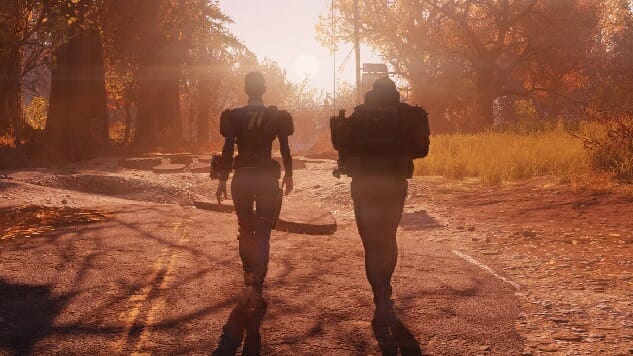Back when the marketing and promotion for Fallout 76 was just ramping up and I made a trip out to Texas to visit QuakeCon, I was optimistic about how in-game griefing would be handled when the MMORPG would make its debut. It was an unusual feeling for me at the time; over the past several years I’ve had hardly any reason to believe in Bethesda’s stewardship of the series. But I felt the premise of their approach, which encouraged self policing within the community while making the process a bit fun, was creative. Heck, I could see myself even wanting to indulge in it: I envisioned posses of players, maybe even me and my own sister, tracking down evil-doers and grabbing them by their digital collars and showing them the door. It sounded like an enjoyable way to deal with the inevitable problems faced by community-based games.
It turns out that motivation to indulge the back and forth of griefers and those who are bothered by them, as was pointed out to me on Twitter at the time, is exactly what makes the Fallout 76 bounty system a problem. For those who genuinely want to annoy or harm others, the idea of being a wanted outlaw on the map, with the additional honor badge of playing the game at a more difficult level due to attacks by other players, is just an incentive: it both gives them the attention they want, and makes them feel like they’re a superior player for their troubles. It’s a recipe for disaster, one that additionally shifts the responsibility away from Bethesda in terms of moderating their own game.
But if you’ve been playing Fallout 76 at all, you know this point is moot. There aren’t enough players in the game to make it an issue. I not only rarely encounter other players when I’m exploring the map, but when I do, most of them want the same thing I do: to either complete their part of the mission in peace, or to run away to another part of the map the minute they see you. Most players seem to enjoy the solitude, and will only bother you if they have reason to, a dynamic that positively contributes to the atmosphere of the game. I don’t particularly like looking over my shoulder for other players, but they’re so infrequent, it feels perhaps closer to the population scarcity that one would expect following a nuclear event.
This isn’t the only game whose griefing “problem” was solved before it even became an issue. I’ve heard from players of other games that while a few bad apples can spoil the whole barrel, sometimes the low population in an MMO lends itself to the intended cooperative atmosphere, a phenomena even Fallout 76 has experienced, with some players actually making an effort to establish a welcoming community for newcomers. For now, this isn’t Bethesda’s biggest issue in the game. In the future, they could even strengthen the pro-social slant of the emerging community by strengthening some of its other features (for example, expanding settlement capacity, and making it a little harder to wander into another player’s camp unannounced, which usually ends in gunfire). They haven’t necessarily curated the positive environment of Fallout 76, but that doesn’t mean they can’t lean into it. As the game improves over the inevitable updates in the upcoming year(s) and new players come in, they’ll need to reinforce the structures that encourage cooperative play as the population grows and griefers have more potential targets to pick on.
Until then, if you were worried about griefers in Fallout 76, don’t be. That problem for now seems to have solved itself.
Holly Green is the assistant editor of Paste Games and a reporter and semiprofessional photographer. She is also the author of Fry Scores: An Unofficial Guide To Video Game Grub. You can find her work at Gamasutra, Polygon, Unwinnable, and other videogame news publications.
